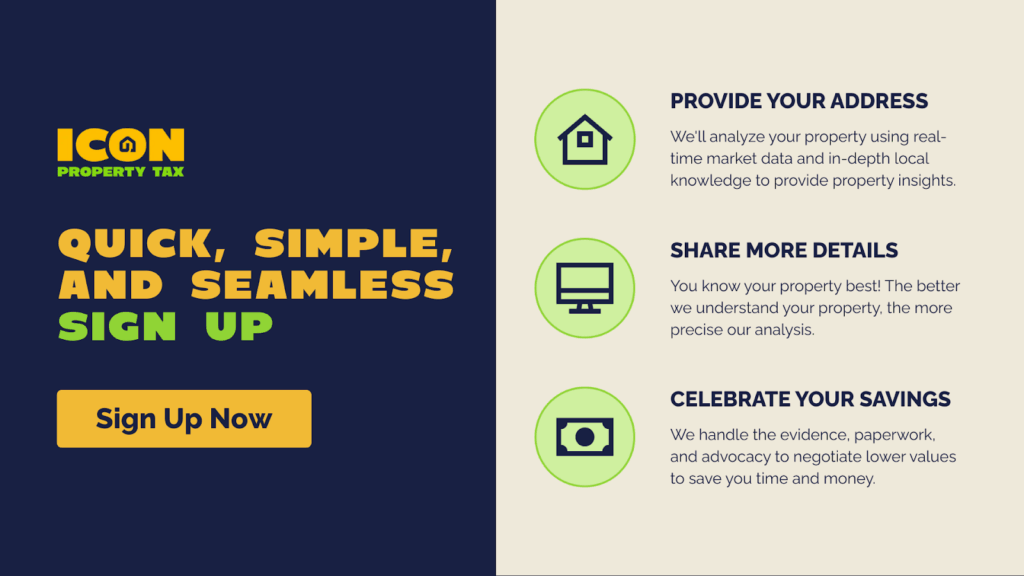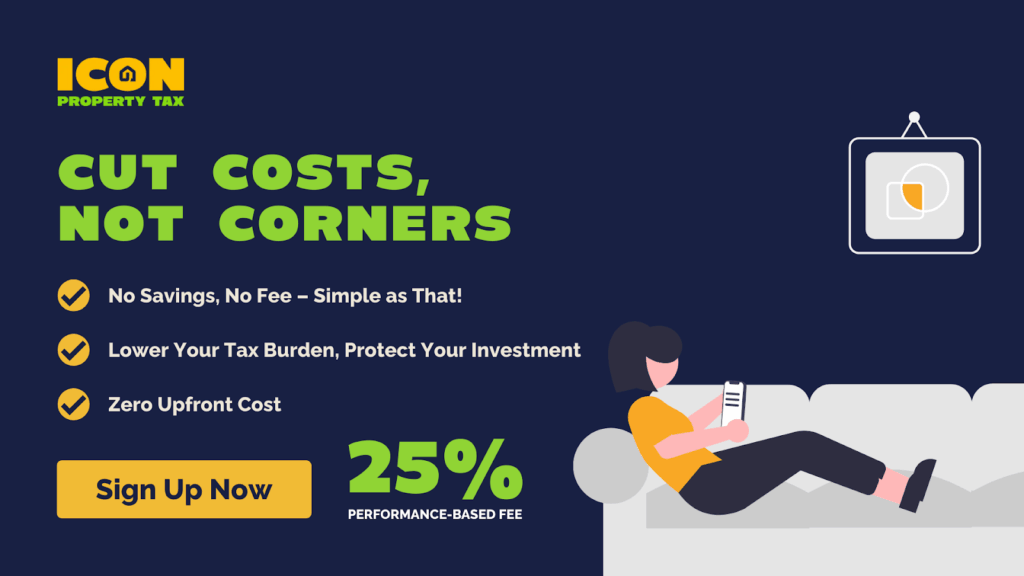Shelby County Property Tax: What Homeowners Need To Know In 2025
September 8, 2025
Key Takeaways:
- The Complexity Of Shelby County Property Tax: Shelby County property tax assessments involve complex calculations and deadlines, requiring homeowners to stay informed and proactive to avoid overpaying.
- Common Errors That Increase Tax Bills: Key errors such as outdated records, incorrect property classification, and missed exemptions can lead to unjustly high tax bills, making it crucial to review appraisals carefully.
- The Value Of Professional Assistance: Seeking professional assistance through a performance-based model, like Icon’s services, ensures expert advocacy in challenging inaccurate assessments and claiming exemptions, with payment contingent on achieving tax savings.
At Icon, we’ve saved property owners more than $100 million by reducing unfair tax assessments. With a 90% success rate and over three decades of combined expertise, our team knows how to challenge inaccurate valuations. Last year, 82% of our clients saw reductions, with no upfront fees and a results-driven approach that puts homeowners and businesses first. We fight for fair property tax payments so you never pay more than necessary.
Managing Shelby County property tax requires understanding the deadlines, rates, and exemptions that shape what you owe. Each detail influences your bottom line, from certified tax rates to reappraisal cycles. Homeowners who miss filing dates or overlook available exemptions risk higher bills than necessary. By staying informed on how Shelby County administers property tax in 2025, you can avoid costly mistakes and make smarter financial decisions for the year ahead.
In this blog, we will explore how Shelby County property tax is calculated, the deadlines that matter most for 2025, common mistakes that lead to inflated bills, and the options homeowners have to appeal inaccurate assessments and fight for savings.
How Shelby County Property Taxes Are Calculated
Like most counties in Texas, Shelby County uses a fairly straightforward formula to determine your annual property tax bill. Still, the process behind the scenes is more detailed than most homeowners realize.
Annual Appraisal Of Property Value
First, the Shelby County Appraisal District assesses the market value of your property each year. This appraised value is their estimate of your property’s worth as of January 1st using local market data, recent sales, lot characteristics, and any improvements or changes over the past year. After arriving at a valuation, exemptions you qualify for, such as the homestead exemption, over-65, or disabled veterans’ relief, are subtracted from the appraised value to get your taxable value.
The Role Of Local Taxing Entities
Next, local taxing entities (such as the county, school districts, cities, and special districts) set tax rates based on their budgets for the coming year. These rates, often expressed as a dollar amount per $100 of taxable value, are multiplied by your property’s taxable value to calculate each portion of your total bill. The various tax rates are summed to generate your overall property tax rate for the year.
Why Tax Bills Fluctuate Year To Year
The interplay between rising home values and fluctuating tax rates means your final bill can change from year to year, sometimes sharply. Property owners must stay informed, review their annual Notice of Appraised Value closely, and take action if they believe their property was overvalued.

Key Assessment And Payment Deadlines For 2025
Shelby County’s property tax process involves several important dates, each affecting how much and when you pay. Missing a deadline can lead to penalties or lost opportunities to appeal, so staying organized is critical.
Here’s what homeowners and business owners should mark on their calendars for the 2025 tax year:
- Early January: The county appraisal district begins sending annual notices of appraised values. Check your mail (and online account) for this. These notices are the starting point for any questions or objections about your assessed property value.
- April 15: The deadline for filing business personal property renditions is April 15. If you own commercial property or tangible business assets, be sure your filings are in by now to avoid costly penalties.
- Mid-May: Most residential property owners will receive their official 2025 Notice of Appraised Value around this time. This notice details the county’s opinion of your property’s market value and serves as your warning of your tax bill.
- 30 Days From Notice Receipt: If you believe your property was overvalued or misclassified, you must file an appeal or protest within 30 days of receiving your notice. This is your window to challenge the appraisal; miss it and you’re locked into the assessment for the year.
- July: County Appraisal Review Boards (ARB) hear appeals and resolve disputes. Keep track of any scheduled hearings, and gather your supporting evidence well in advance.
- October 1: Bills for 2025 property taxes are typically mailed on or after this date. Check both your physical mailbox and your county online portal.
- December 31: Final day to pay property taxes without incurring interest and penalties. Payments received or postmarked after this date will be subject to escalating late fees, so plan accordingly.
These deadlines shape the assessment and payment experience for Shelby County property owners every year. Mark them in your calendar and act promptly at each stage to avoid surprise bills or missed appeal opportunities.
How To Read Your 2025 Property Tax Bill
Deciphering your 2025 Shelby County property tax bill doesn’t have to feel like unraveling a puzzle box. Every bill you receive comprises several key components, and understanding what each element means is essential for every property owner.
Property Description & Account Information
At the top, you’ll spot details identifying your property, parcel number, address, and legal description. Double-check this information against your records to spot any discrepancies early.
Appraised Value vs. Assessed Value
Next, look for the appraised value: what the county believes your property would sell for in the current market. The assessed value is the tax office’s number after accounting for applicable exemptions or caps. Misalignment here could be a starting point for an appeal or protest if the appraisal exceeds your property’s actual market value.
Exemptions
Exemptions reduce the taxable portion of your property’s value. Common avenues include homestead, over-65, or veteran’s exemptions. Check that any exemptions you’ve applied for are accurately reflected; omissions can quietly raise your tax liability.
Taxing Entities And Rates
Shelby County property tax bills break down which authorities, such as the county, school district, city, or hospital district, are collecting taxes, and their specific rates. Each entity’s rate is listed per $100 of assessed value. Knowing these details helps you trace where your dollars are going.
Total Amount Due And Billing Timeline
Your bill will clearly state your total due and due dates, early payment discounts (if any), and possible penalties for missed deadlines. Staying on top of this timeline can mean avoiding costly late fees.
Payment Options And Appeal Instructions
Look for instructions if you want to appeal, or, as the county often calls it, “protest” your valuation. Understanding these steps early can help you gather evidence and start the appeal process well before deadlines.

Common Assessment Errors That Raise Your Bill
Shelby County’s property appraisal process is complex; even small mistakes can unfairly inflate your tax bill. If your assessment feels high, you’re not alone; several recurring errors frequently impact both homeowners and businesses:
Outdated Property Data
Appraisal districts rely heavily on property records, which sometimes get outdated. Additions, renovations, or demolitions may not be reflected accurately, leading to higher or incorrect values.
Incorrect Property Classification
If your home or commercial space is placed in the wrong category (for example, residential property assessed as commercial), you could receive a higher bill due to different valuation methods.
Comparable Sales Mix-ups
Assessors often use sales of similar properties (“comps”) to set values. Sometimes, they compare your property to newer, significantly upgraded, or larger homes or business properties nearby, instead of similar ones.
Overlooked Property Condition Issues
Issues like foundation problems, storm damage, or outdated interiors can decrease property value. If these issues aren’t documented or considered, your assessment could be too high.
Missed Exemptions
While exemptions aren’t always automatically applied, neglecting to include a qualifying exemption, such as a homestead or over-65 exemption, can increase your taxable value unnecessarily.
How Icon Fights For Fair Property Taxes In Shelby County
Homeowners and commercial property owners in Shelby County are all too familiar with the complexities and frustrations of rising property tax assessments. That’s why working with a dedicated partner who advocates for fair property appraisals can make a significant difference.
Comprehensive Market Analysis And Research
The process begins with a comprehensive market analysis. Leveraging real-time neighborhood data, in-depth market trends, and the specific valuation methods used by Shelby County officials, the approach dives deep into every factor that could impact your tax bill. This means reviewing county numbers and searching for every detail, such as comparable sales, changes to the property, legal nuances, and shifting market conditions, that could prove your assessment is too high.
Experienced Experts Building Your Case
Local property tax experts handle each step, translating years of practical experience into a deliberate case to achieve savings. These professionals gather evidence, prepare documentation, and build an effective appeal to challenge inaccuracies or outdated appraisal data. Negotiating with county assessors is professional, data-driven advocacy on your behalf.
Technology For Transparency And Efficiency
Technology plays a central role throughout. A streamlined online platform lets you initiate, track, and review each phase of your Shelby County property tax appeal. Updates, deadlines, and decisions are easily accessible, taking the guesswork out of the process and giving you transparency at every turn.
A Performance-Based Fee Structure
The performance-based fee structure is critical to this service model: payment is only required if you see a reduction in your property tax bill. This aligns incentives, setting up a relationship where both sides are motivated by one thing: fighting for the lowest possible assessment.
Guidance For Exemption Applications
For exemption applications, guidance is available to help you review and confirm eligibility before submitting, so no opportunity to lower your Shelby County property tax burden is missed due to paperwork errors or overlooked requirements.

Final Thoughts
As we look ahead to 2025, understanding the intricacies of Shelby County property tax becomes increasingly vital for homeowners and business owners. Rates change, values fluctuate, and property tax assessments can quickly become a burden if left unchecked. If you believe your assessment doesn’t reflect your property’s actual market value, pursuing an appeal can lead to significant savings.
This is where Icon steps in to stand up for your right to fair property taxes. Our experienced team leverages market data and local expertise to fight for lower assessments, handling every detail so you can focus on what matters most. From the initial analysis through every negotiation, our tech-enabled platform keeps you informed, while our performance-based model means you only pay if we save you money.
Ready to take the next step? Explore your appeal options with Icon and experience transparent, aligned, and effective property tax representation.
Read also:
- How Property Taxes Work And What You Need To Know About Them
- How Much Do Property Taxes In Florida Run On Average?
- How Home Renovations Can Affect Your Property Taxes
Frequently Asked Questions About Shelby County Property Tax
What is the property tax rate in Shelby County for 2025?
Property tax rates in Shelby County are set annually by local taxing authorities and may vary depending on the city, school district, or special districts your property falls within. For 2025, rates will be published by Shelby County closer to the new tax year.
When are property taxes due in Shelby County?
Property tax bills are typically mailed out in the fall, and payment is due by January 31 of the following year in Texas counties, including Shelby. If you own property in Shelby County, mark your calendar and keep an eye on your mail in late autumn to avoid missing deadlines.
What happens if I pay my property tax late in Shelby County?
Late property tax payments in Shelby County incur penalties and interest, which increase the longer your bill goes unpaid. After February 1, a 7% penalty and interest are usually added to your balance, with additional charges compounding monthly. Don’t risk losing your property—pay on time or seek help immediately if you’re struggling.
How is Shelby County property tax calculated?
Shelby County calculates property taxes based on your property’s appraised value, as determined by the county appraisal district. This value is then multiplied by the combined tax rates from local jurisdictions (like schools, city, and county). If you qualify, exemptions are applied after the initial calculation to reduce your taxable value.
Can I appeal my property tax assessment in Shelby County?
Yes. You can protest or appeal your assessment if your property’s appraised value is too high or contains errors. Many Shelby County property owners lower their tax bills yearly by appealing.
Are there any exemptions for Shelby County property tax?
Shelby County offers property tax exemptions for qualifying residents, such as those for homestead, over-65, disabled individuals, and veterans. Icon does not directly file exemptions for you. Still, our team can review your exemption application before you submit it, helping you avoid errors that might prevent you from getting the savings you deserve.

